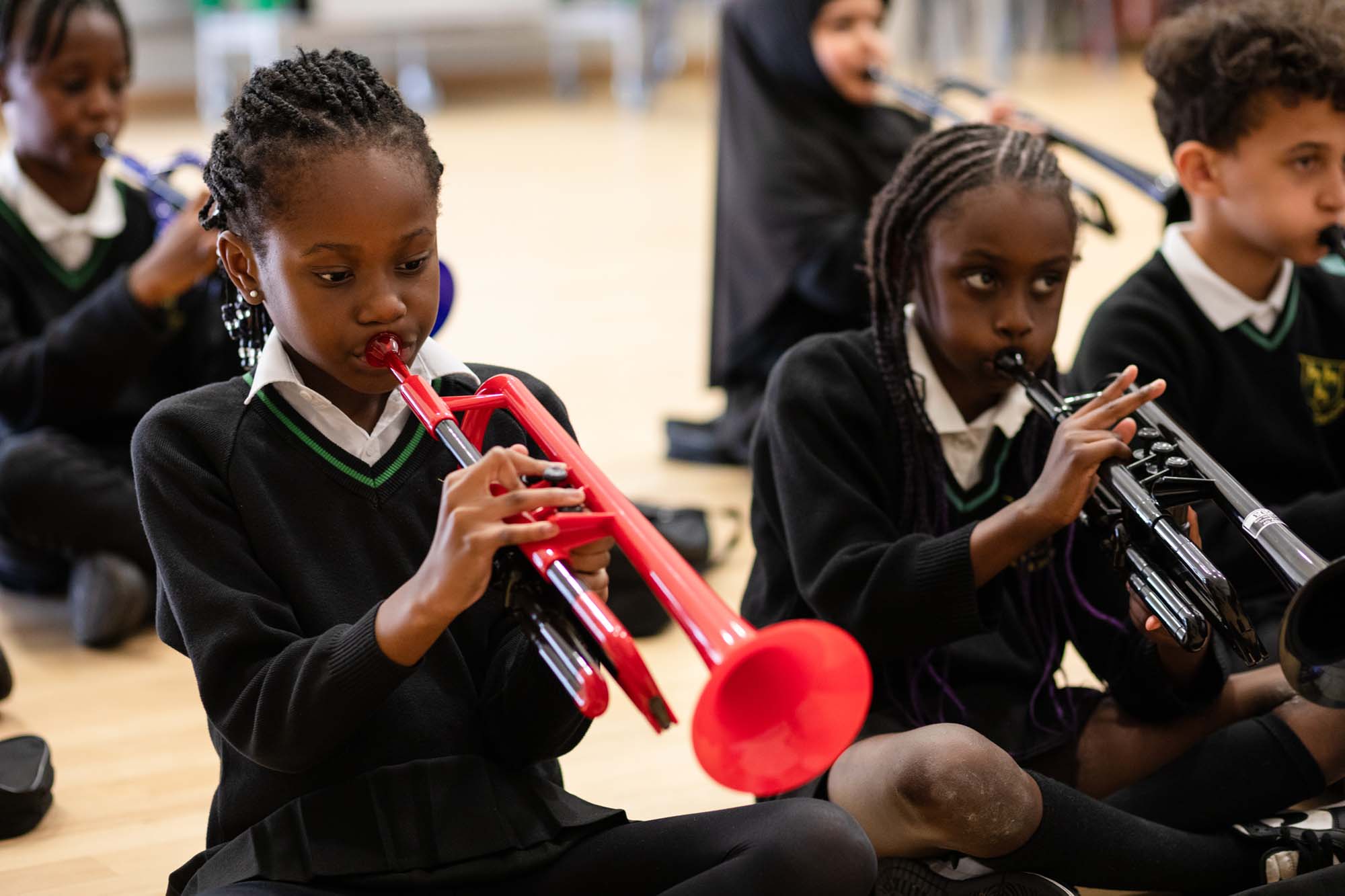
The power of music to transform young lives
Music in primary schools
Words by Fiona Thompson
Photography by Paul Read and Jayne Lloyd
Spend a day in the music room at Manor Oak Primary School in Orpington, Kent, and you’re guaranteed to leave with a huge grin on your face. The children have so much fun and their enthusiasm is infectious.
At the school, 27 languages are spoken, so Manor Oak has chosen to make music a priority as it’s a language that everyone understands. Unusually for a small school with an extremely limited budget, Manor Oak funds a qualified music teacher, Amanda Butler, who delivers music lessons to all classes once a week, as well as overseeing a half hour music performance assembly.
Pupils discuss what they love about music. Anna*, who’s 8, says: “I like everything about music. Playing music is just space to give me a chance to be myself.” At school, she plays the drums and the ukulele, but she also talks about dancing in the kitchen with her dad to ‘Smoky Mountain Memories’ by Dolly Parton.
Connor, 10, finds playing music relaxing. He says: “It’s peaceful when you get all the notes right. It just calms you down if you’ve had a bad day.” Eleven-year-old Aaron enjoyed playing the ukulele in a school performance of ‘When she loved me’ from Toy Story at Fairfield Halls in Croydon. He’d also like to play the accordion, inspired by the episode of Peppa Pig where Daddy Pig found an old squeeze box in the attic.
Here’s a quick sample of what you’re likely to hear in Manor Oak’s music room. First thing, Year 2 children, aged 6 and 7, are learning the basic building blocks of rhythm with a ‘musical fruit’ system. Each type of fruit relates to a note, according to the number of syllables it has. So pears are crotchets, apples are quavers and watermelons are semiquavers. The children follow the notated music, shouting out the fruit that fits the rhythm of the note on the page.
A little later, Year 1 children, who are 5-6 years old, are singing an African song, Senwa Dedende, about a mother who’s calling their child to come and eat. The pupils improvise on simple percussion instruments as they sing. Some are playing West African djembe drums, others are shaking maracas, creating a rasping sound by scraping a stick along a ‘guiro’ gourd or tapping out a tune on metal ‘agogo’ bells that are often used in samba music.
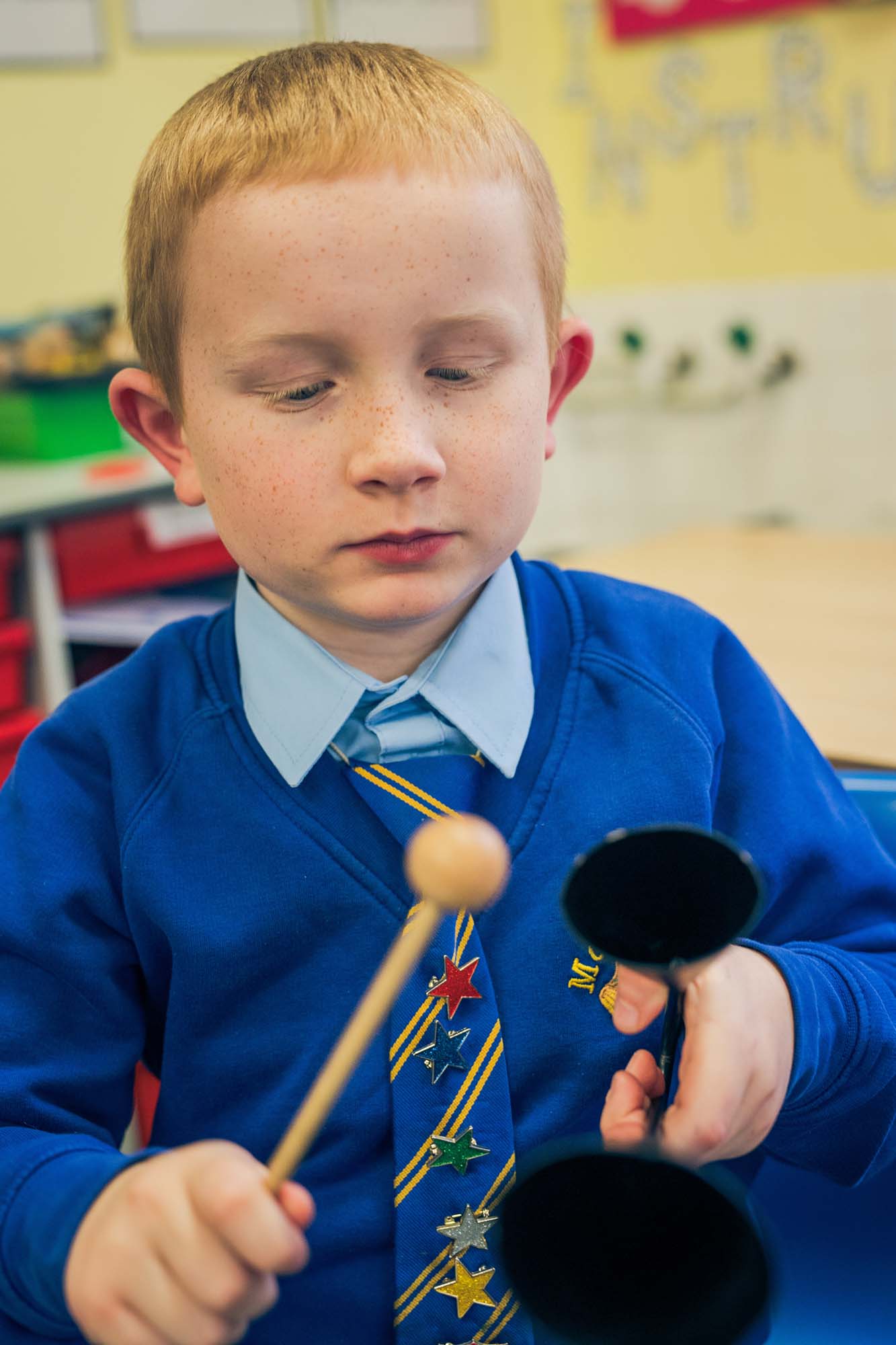
At lunchtime, a choir of children of all ages squeezes into the room, practising songs for an upcoming concert at a local care home. After lunch, the Year 5 children (aged 9 and 10) come in and make a beeline for the ukuleles. Everyone joins in, strumming along and singing a song that goes ‘My ukulele has a body, a neck and a head, but it’s got no arms or legs’.
It’s all done on an absolute shoestring. In this school, you won’t find cupboards full of guitars, violins, flutes or clarinets. There are no ranks of keyboards, no drum kits and no iPads for music technology.
“The only reason we even have a set of djembe drums is because my sister donated them,” says Amanda. “We had to beg, borrow and steal to get enough hand-held percussion for half the class. There are just no resources.
“I’ve taught in other schools where walking into the music room is like walking into a palace full of instruments. In one school, the Parent Teacher Association regularly raises £20,000 a year for the music department. They have 11 peripatetic music teachers and many of the children learn two or three instruments each. Here, the school can’t afford instruments and neither can most of the pupils’ families.”
It’s hardly surprising that a 2019 report by the Social Mobility Commission found that children from the wealthiest backgrounds are three times more likely to take up music classes out of school hours than children from the poorest backgrounds.
Amanda adds: “At Manor Oak, I walk into my scruffy music room with a bit of lino covering up a gap in the carpet. But give me this place any day. The social deprivation in the area is huge, but we have such fun. It’s the happiest school you’ll ever visit. It’s clear, though, that a school like this wouldn’t work so well without a very special person at the top.”
That person is headteacher, Jane Butler, who’s been at Manor Oak for 15 years. “I love the school’s sense of community,” she says. “I love the warmth here and the sense of being a family.
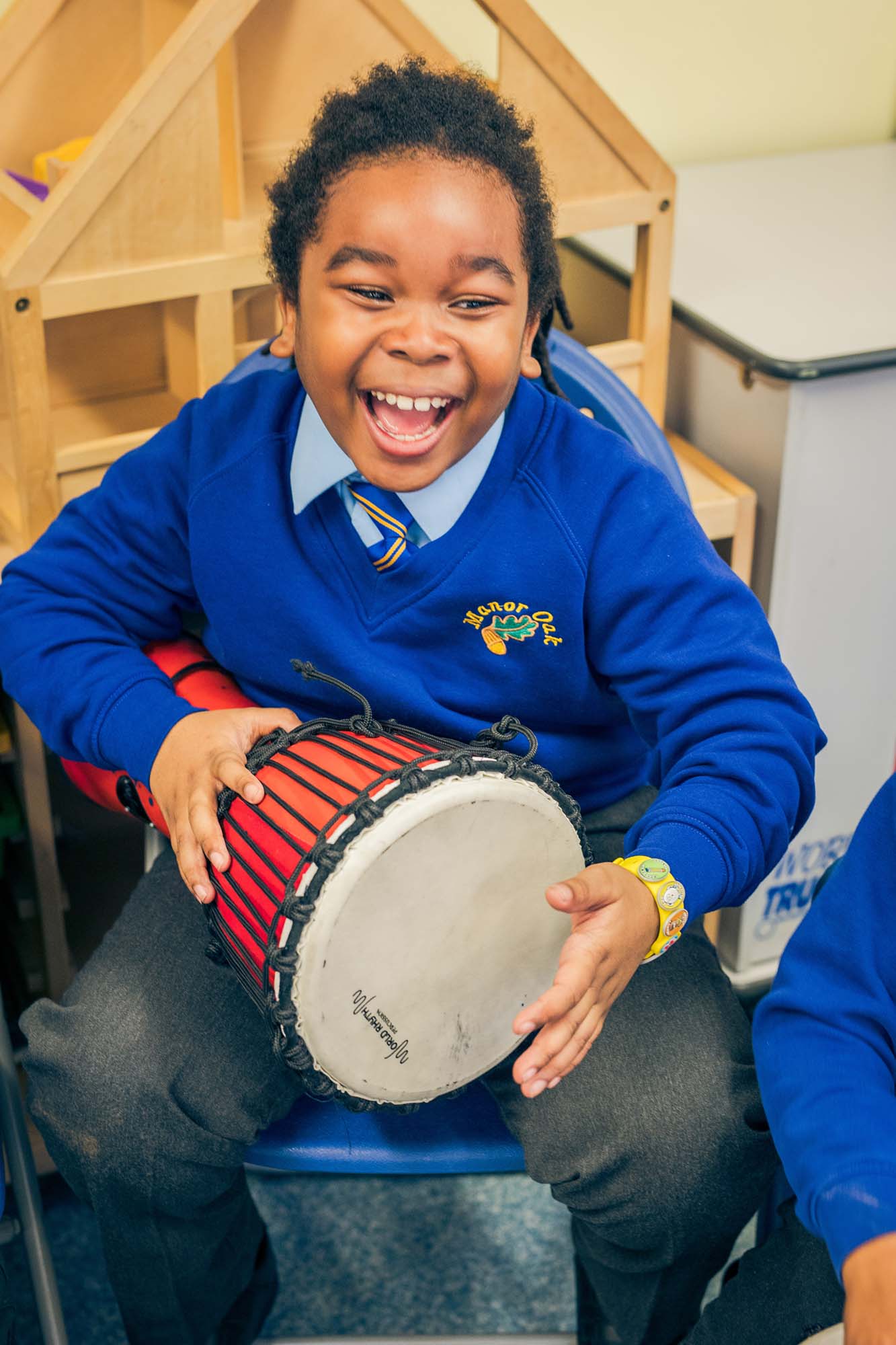
“I’ve seen how music brings life to the school and unites parents, children and the school community in new ways.”
“I love the diversity, too. We have a high percentage of Gypsy Roma children as well as refugees from all over the world, including Syria, Algeria and Albania. Over a third of our children – 36% – have English as a second language. It all adds to the richness of our culture and community.”
At Manor Oak, 46% of children are eligible for pupil premium funding, a government grant to support children who are disadvantaged either due to income or family upheaval. This is almost double the rate (24%) for schools in Kent as a whole.
“Our intake covers the nearby travellers’ site, as well as emergency housing for refugees and people who’ve experienced domestic violence,” adds Amanda. “It’s quite a transient population. We have a one-form intake and the school’s not full, which means we miss out on some of the pupil premium money we might otherwise receive.
“I do my best to inspire children to love music and to improve their confidence, but it’s heart-breaking that so few of them will have the chance to progress in music. It makes me so sad because some of the children here are so talented, but they’ll never have the opportunity to have one-to-one music lessons.”
For the vast majority of children at Manor Oak, music lessons are limited to one class music lesson once a week, delivered by Amanda, who is employed by the Bromley Youth Music Trust.
At the moment, 13 children at the school receive one free 15-minute music lesson in piano or guitar a week with visiting peripatetic teachers, funded through the pupil premium scheme. One parent is paying for their child to have a private piano lesson. Most of the guitar students have guitars at home to practise on; most of the piano students don’t have a piano at home.
“One child told me they’d drawn a keyboard on paper so they could ‘practise’ playing the piano at home,” says Amanda.
“Parents on a low income get a 25% reduction on music lessons,” she adds, “but if they’re on the minimum wage, lessons will still be far too expensive. Other children might be eligible for free lessons, but their parents might not understand English well enough to fill out the forms. They may be more focused on survival than getting music lessons for their child.”
Against this backdrop of considerable deprivation, Jane is convinced that music has the power to transform children’s lives.
“Music is hugely important,” she says. “If you learn to sing or play a musical instrument, you learn discipline, focus, resilience, teamwork and creativity. It’s a new language and it’s good for children’s maths skills too. I’ve seen how music brings life to the school and unites parents, children and the school community in new ways.”
Less than ten miles away, another primary school is also drawing on the power of music to make a difference in children’s lives.
Prendergast Vale School in Lewisham, south-east London, is part of the Leathersellers’ Federation of Schools. This inner-city borough has some of the highest levels of child poverty in the country.
“As a school, our resources are stretched,” says headteacher Edmund Coogan. “But we’re lucky that we receive additional support from the Leathersellers’ Federation. This doesn’t directly fund music, but it frees up money that we can direct towards high-quality music provision.”
The school demonstrates its commitment to music by providing trumpets and trumpet lessons for all pupils in Year 4. “At Prendergast Vale, 45% of our students come from a background of disadvantage,” says Edmund. “Many of our families struggle financially. For most of them, buying an instrument for their child would be out of reach. So I’m proud that we’re able to offer children this resource which sparks both their creativity and their ambition.”
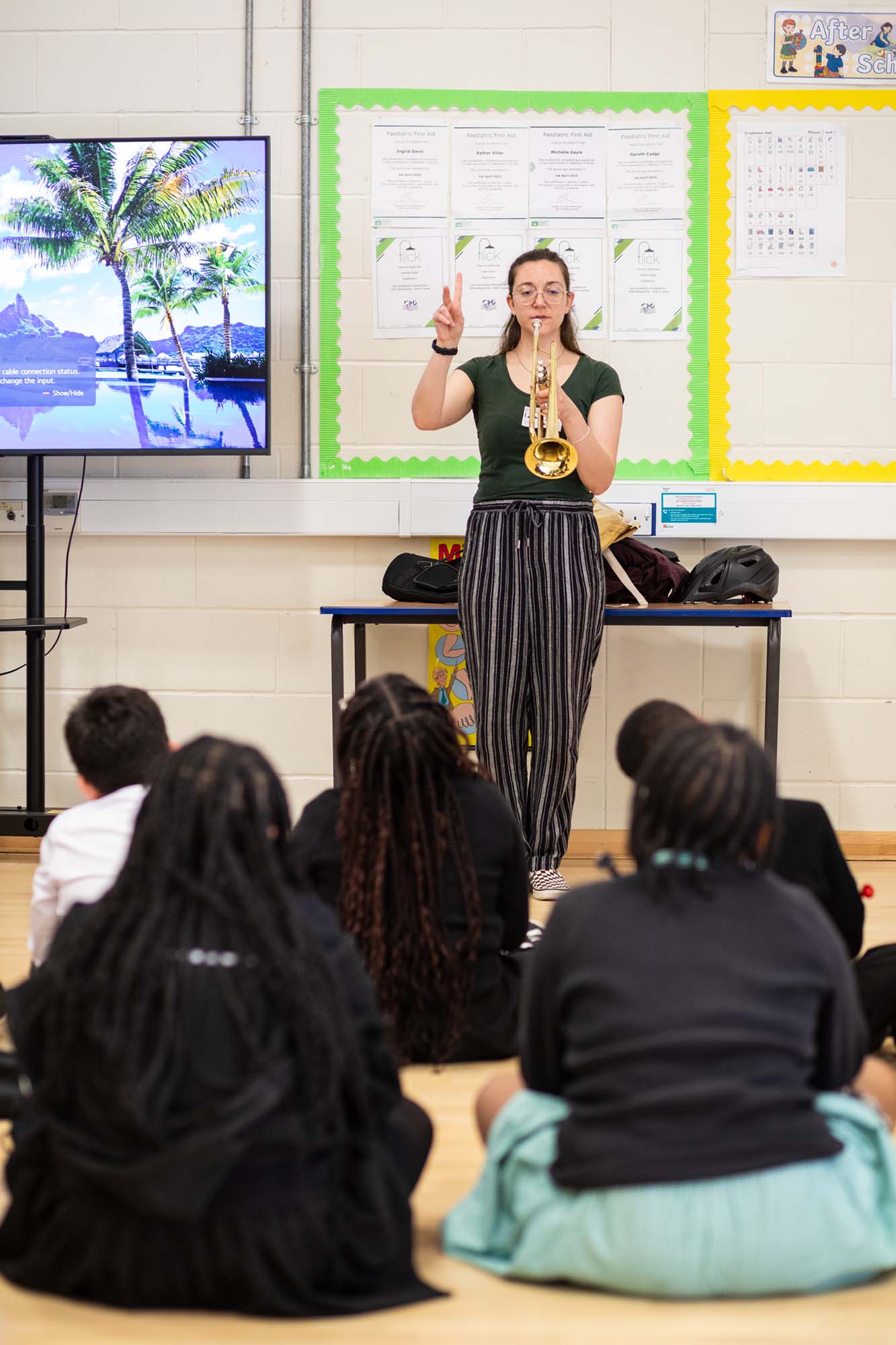 A trumpet lesson at Prendergast Vale School
A trumpet lesson at Prendergast Vale School
As with Manor Oak in Orpington, it’s clear that the school’s leadership team places a high value on music and the creative arts.
“Sometimes music can be pushed down the curriculum at primary schools,” says Emma Long, head of primary at Prendergast Vale. “But music is firmly embedded here. Every child from Year 1 to Year 6 has at least one music lesson a week.”
Prendergast Vale is a through school, taking children from nursery to Year 11. “So we’re lucky to have secondary music teachers teaching primary pupils,” says Emma. The school also benefits from being the base for the Lewisham Music Service, as well as from projects run by the English National Opera and singing lessons provided by the ‘Primary Robins’ charity.
“It’s wonderful to see how music brings children out of their shell and helps them grow in confidence,” says Edmund.
“I just love all of our music lessons,” says David, who’s nine. “With the trumpet, when you learn the right way to play it, you can play high and you can play low. It gets really fun.”
For Ethan, also nine, music is above all a way to unwind. “Music calms people down,” he says. “It’s enjoyable and it helps me relax.”
Meanwhile, ten-year-old Claudette loved her experience of singing in a school production of Bugsy Malone. “I got butterflies before the show because I didn’t know if I could perform,” she says. “And I didn’t know there’d be 100 people in the audience. But I found it really exhilarating when I was on stage and I started to get really confident in myself. I knew I could do it.”
“Music is important because it creates moments that matter and it creates memories,” says Edmund. “Our children will always remember when they performed on stage and their parents and grandparents applauded them.
“Music helps develop the whole child and so many of the skills you acquire in music education are transferable.”
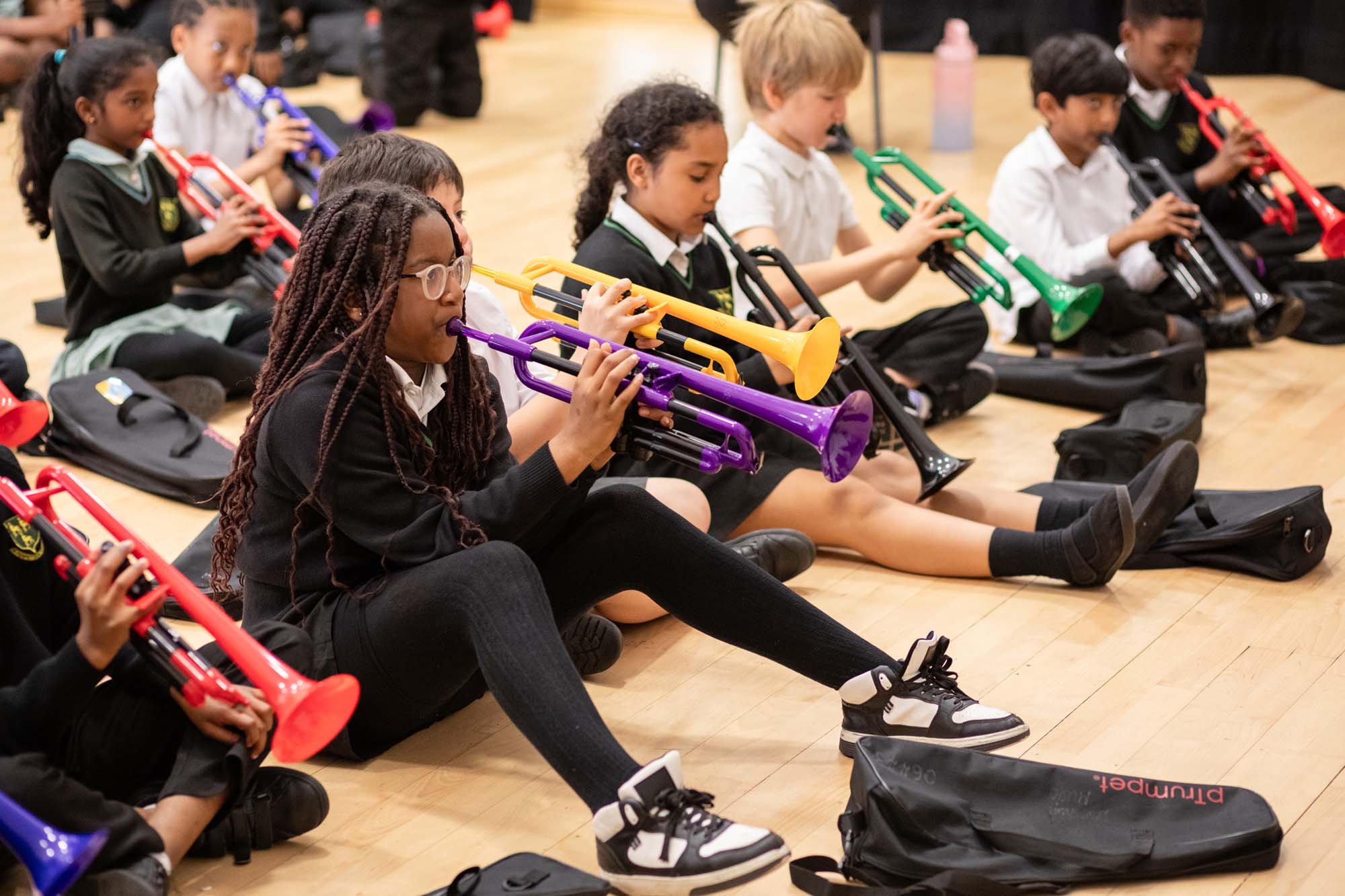 Prendergast Vale students during a trumpet lesson
Prendergast Vale students during a trumpet lesson
Amanda at Manor Oak agrees, adding that: “Learning music can also give you a much wider social circle. When children go on to secondary school, if they’re passionate about music, it helps them to connect with new people and develop the kind of social and team skills that employers are looking for.”
“I think everybody understands the word deprivation,” says Jane from Manor Oak. “But I’m not sure that everybody understands what that looks like in action. For our pupils, it means they rarely leave their local area. Ask children what they’re doing at half term and they’re not going to Disneyland or even up to London. Parents don’t take their children swimming; they take them to the food bank.”
In 2023, children from Manor Oak took part in two performances that represented extraordinary experiences for the pupils, many of whom had never performed or visited a concert hall before.
The first was a performance in March at the Bromley Schools’ Proms in Fairfield Halls in Croydon. “I knew the children would crumble if they were forced into the spotlight alone,” says Amanda. “So we took a group of 52 children from Years 3, 4 and 5 along to perform together. They sang Karl Jenkins’ Adiemus, six children played the recorder, and they did some African drumming.
“Over five weeks, I taught one ten-year-old child to play the flute, which was an incredible achievement for her. Then we put together a little orchestra of ukuleles, glockenspiels and recorders. We rocked it out.”
“It was brilliant,” says Jane. “When we got off the coach afterwards, all the parents were applauding the children. Our pupils had been given an opportunity to enrich their experience in a theatre, a really special place. They felt valued, which was fantastic.”
The next challenge was a performance in November at Langley Park School in Beckenham as part of the NEST Festival of Music. “Manor Oak is part of the NEST group of schools, and many of them are in much more affluent areas than us,” says Jane.
“We wanted to take part, but I was having apoplexy, because I knew that the children from the other schools would be playing Beethoven’s Fifth on the piano or Mozart’s Magic Flute, because they’ve been having music lessons since they were tiny little dots. We just couldn’t do anything on that level.”
Amanda agrees. “At the start, we were told that any children who’d reached Grade 3 could play a solo. That might be normal in some schools, but none of our kids have taken any grades at all, so that counted them out.”
“We had to do something off piste,” adds Jane.
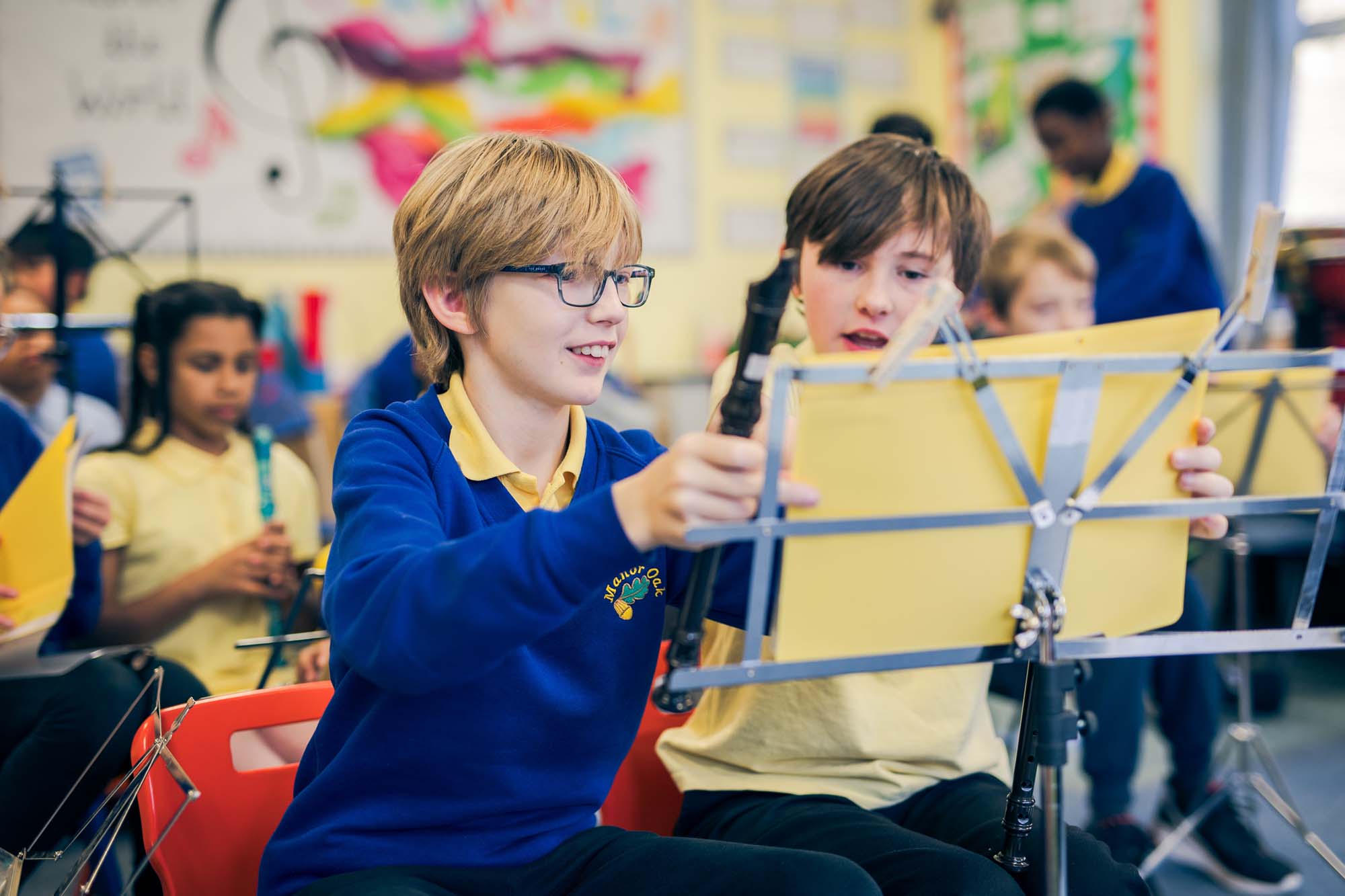 A music lesson at Manor Oak Primary School
A music lesson at Manor Oak Primary School
Amanda’s solution was to create a group performance based on The Story of Colours, a children’s book where characters all the colours of the rainbow interact and go on adventures. “The children composed music for each colour using school instruments that were available during their class curriculum time, including a Fanfare for Purple played on recorders and ukuleles,” she says.
Following their previous experience at Fairfield Halls, the children were ready for the challenge.
“They’d grown in self-esteem,” says Amanda. “They walked in with their heads held high. No one said they were nervous. One boy said, ‘We’re gonna smash it, because we’re so good at this.’ They organised themselves like true professionals in the green room and they went out there and held that audience from start to finish.”
Jane affirms that the NEST performance had a huge impact on the children emotionally, socially and academically. “They were so proud of themselves. Several children told me it was the best day of their life. It also had a knock-on effect on their academic life. If you have experiences, you have memories, vocabulary, language, visuals and imagery. That’s everything you need to be a good writer.”
“Performances like this give children more confidence and resilience. They’re less worried about making a mistake and more prepared to share in class or say something at assembly.”
If Amanda could wave a magic wand, she’d like to have £10,000 to buy a set of steel pans for the school. “I’d also say that every child who expresses an interest in having a music lesson should be given that from the age of four,” she adds. “Not just in primary school, but throughout their whole school career. That would transform so many children’s lives and create a new generation of people who can become tomorrow’s musicians.”
READ MORE
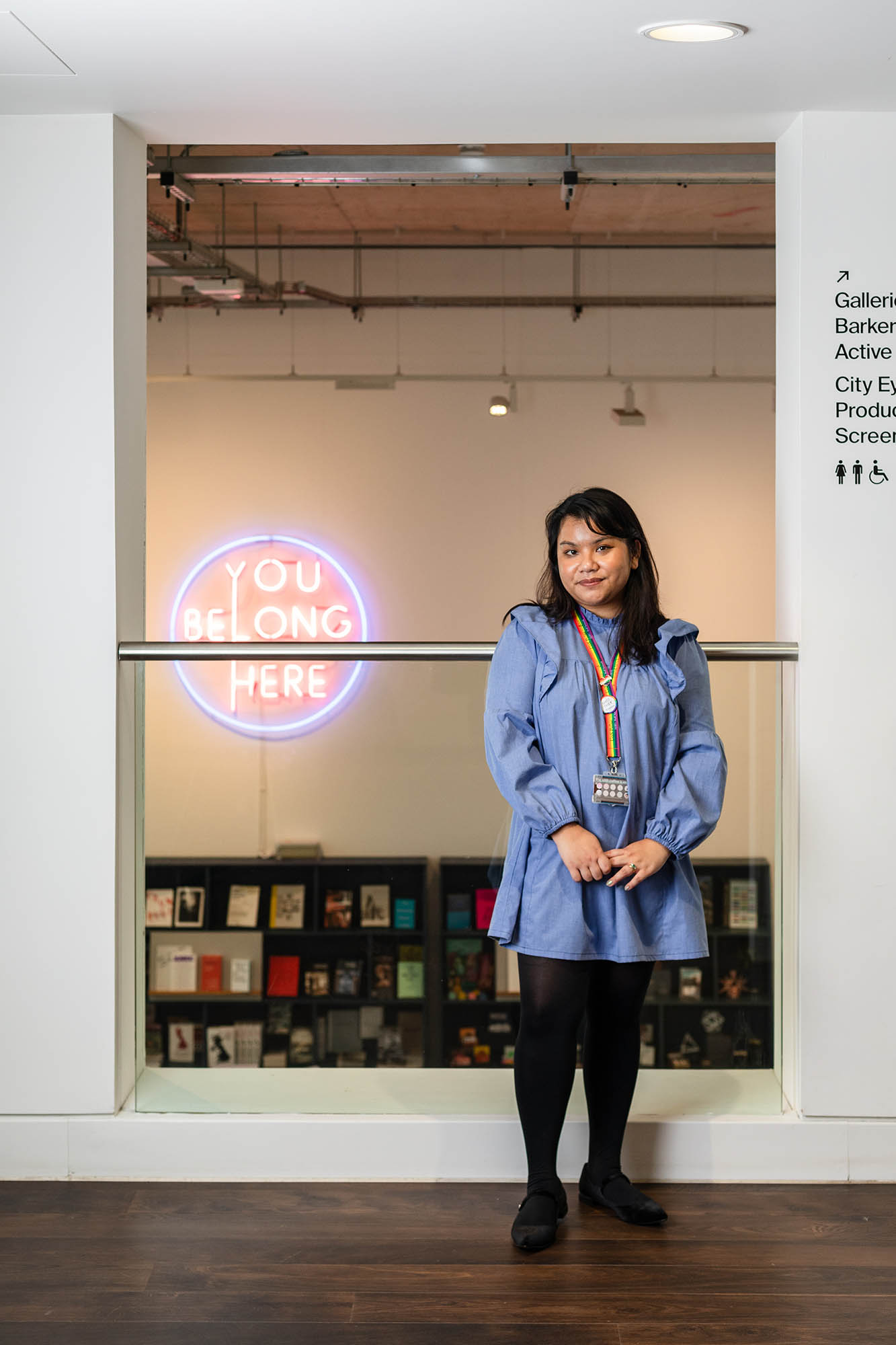
Breaking Through the Class Ceiling
What can a photographic exhibition at Southampton University teach us about social mobility? Students, staff and alumni share their experiences and contribute to a complex, intersectional picture of challenges.
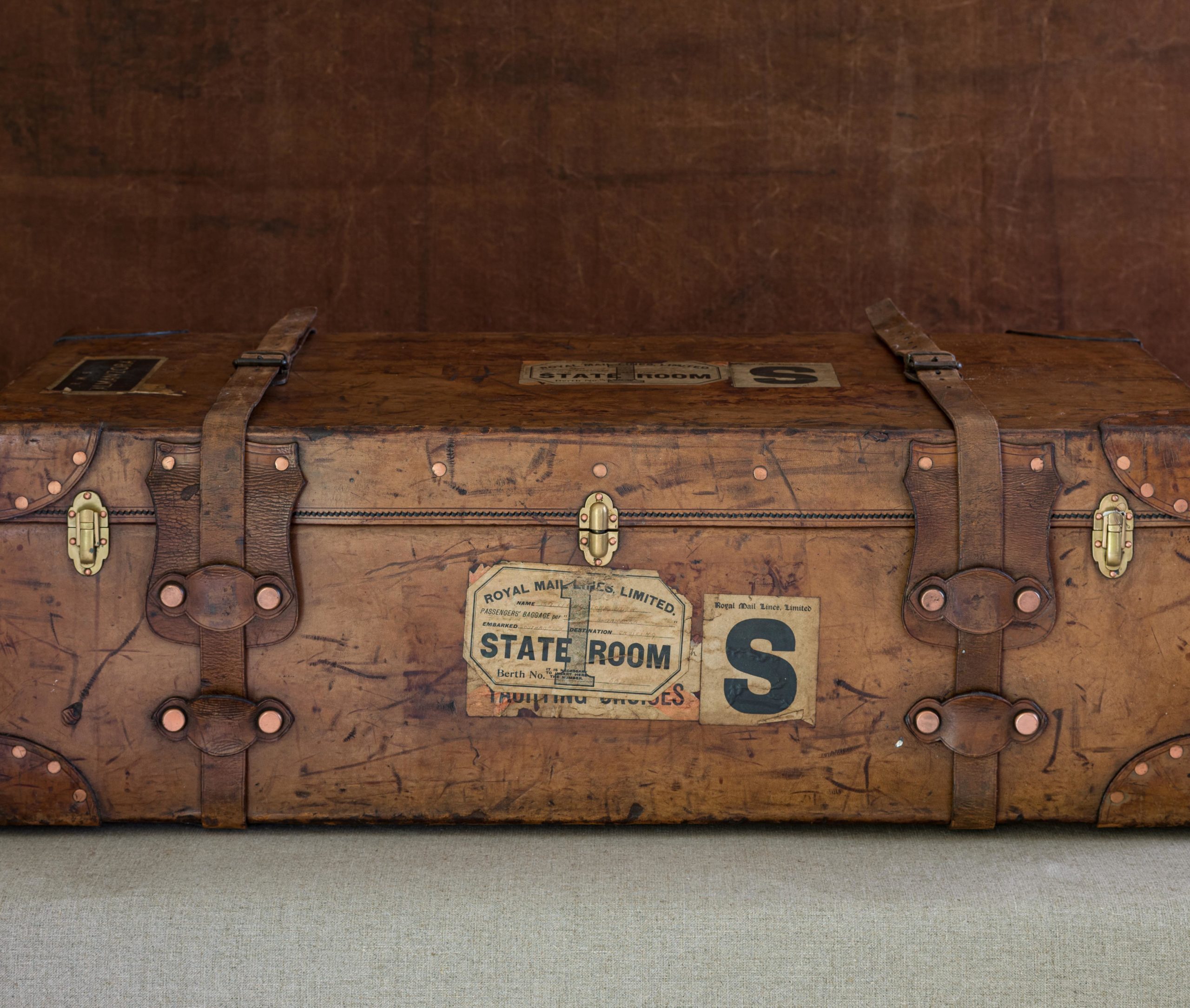
The Rich History of the Leather Trunk
Rory FH Smith charts the evolution of luggage and the role of leather - a story synonymous with changes in transportation.
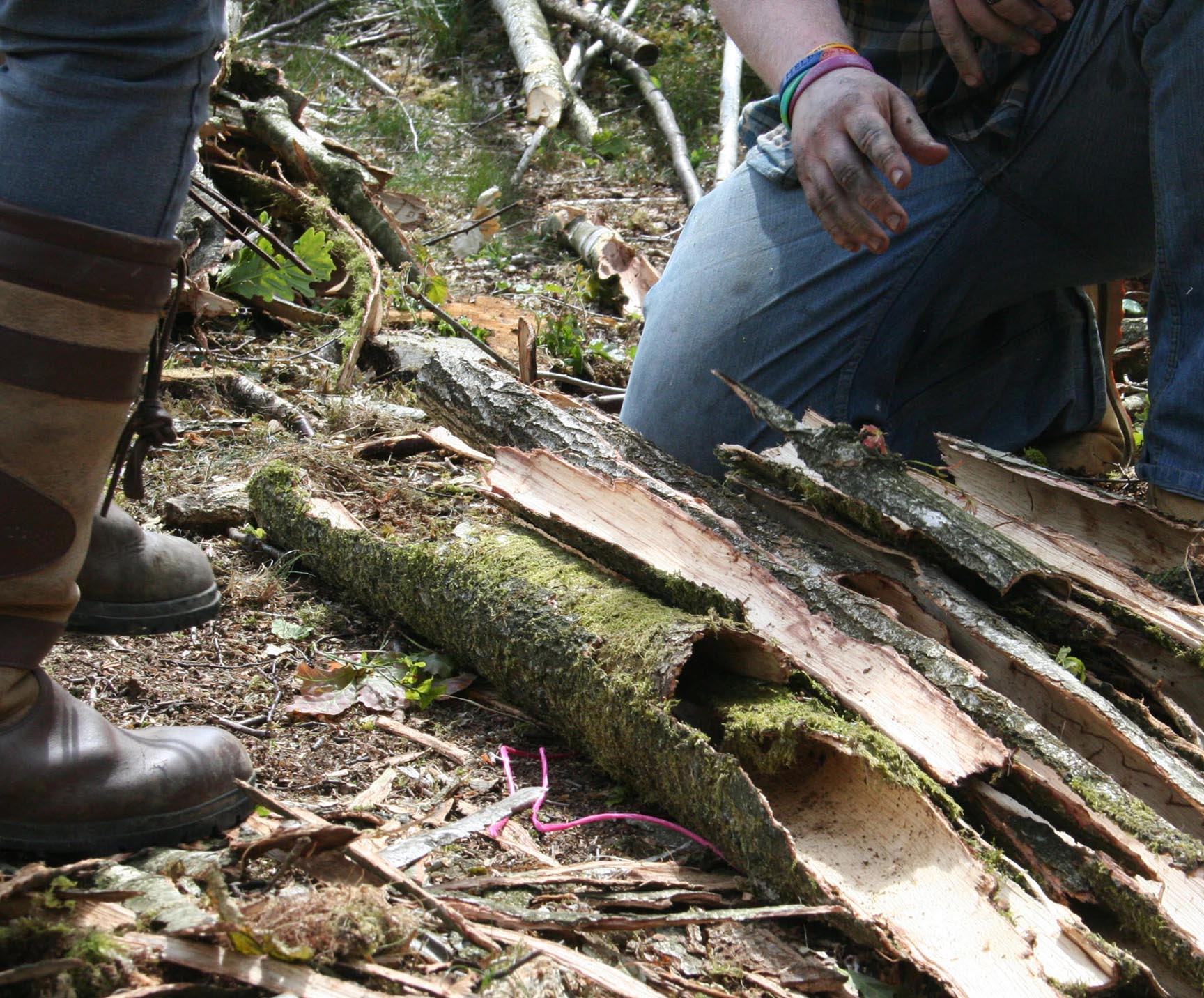
Where the Oaks Grow
A timeless symbol of Britishness, the great English oak and its devoted army of coppicers are fundamental in producing some of the world’s finest tanned leather.